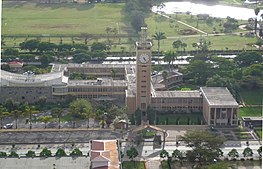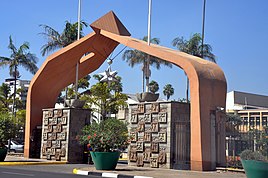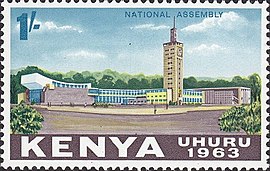
The Parliament Buildings in Nairobi are the seat of the Kenyan Parliament.
History

The buildings were constructed in 1954 and became the home of the colonial legislature of the Kenya Colony, the Legislative Council of Kenya, which sat there until 1963, when the council was replaced by the National Assembly.[1] The buildings, known before 1963 as the "Legislative Buildings", were designed by prominent modernist architect, Amyas Connell, and the town planning advisor to the Kenyan Colonial Government, Harold Thornley Dyer.[2][3] The Parliament has an English-style clocktower which was a design requirement to have the Legislative Buildings echo the Palace of Westminster and Big Ben.[4]
During the Kenya Finance Bill protests in June 2024, the parliament was stormed.[5] 10 protesters were shot dead by police with 31 protesters injured and over 280 protesters arrested as of 25th June.[6]
Burials

Jomo Kenyatta, Kenya's first prime minister, is buried on the estate.[4]
References
- ^ Pathé, British. "New Parliament Building In Nairobi". www.britishpathe.com. Retrieved 2022-01-02.
- ^ "Parliament Building". Triad Architects. February 2017. Retrieved 19 August 2022.
- ^ Shariff, Yasmin (2021). "Modern Movement Houses in the Colonial Capital City of Nairobi" (PDF). Docomomo Journal. 64 (1): 80–83. doi:10.52200/64.A.L3ZCOKJZ. S2CID 234924203. Retrieved 19 August 2022.
- ^ a b "Nairobi, Kenya - Parliament House". www.nairobikenya.com. Retrieved 2022-01-02.
- ^ "Kenya's parliament compound Stormed, building set ablaze, Reuters witness says". Reuters. June 25, 2024.
- ^ Burrell, Miriam (2024-06-25). "Fire erupts as protesters storm Kenya's parliament amid nationwide unrest". Evening Standard. Retrieved 2024-06-25.
1°17′24″S 36°49′12″E / 1.2899°S 36.8200°E



Recent Comments